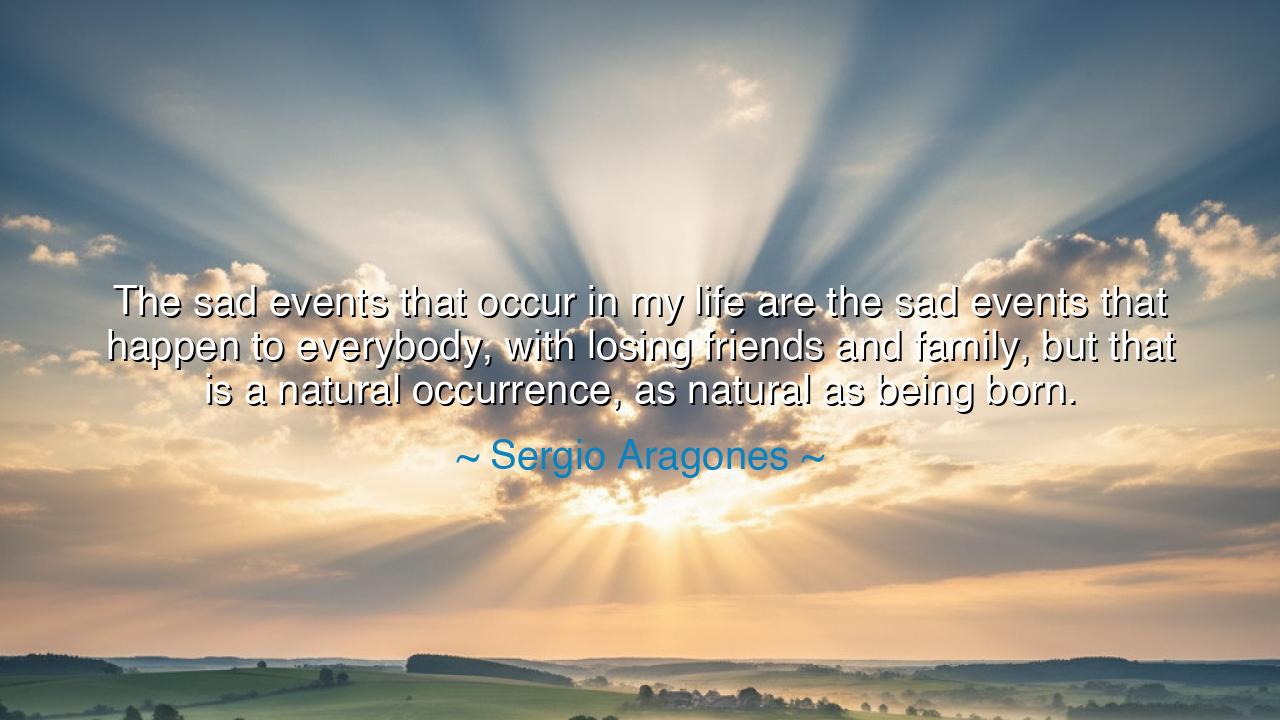
The sad events that occur in my life are the sad events that
The sad events that occur in my life are the sad events that happen to everybody, with losing friends and family, but that is a natural occurrence, as natural as being born.






When Sergio Aragonés said, “The sad events that occur in my life are the sad events that happen to everybody, with losing friends and family, but that is a natural occurrence, as natural as being born,” he spoke with the calm acceptance of one who has seen much and understood more. Beneath these simple words lies the ancient truth that sorrow is not a punishment, but a condition of life. Aragonés, known for his humor and lightness of spirit, reminds us here that even laughter is born from a world that is transient — that joy and loss are woven together in the same fabric. To live is to gain and to lose, to welcome and to let go. In his reflection, he teaches that grief is not a deviation from nature, but one of its most sacred laws.
In the days of the ancients, this wisdom was known by all who looked deeply into the cycles of the world. The philosopher Heraclitus said, “Everything flows,” meaning that nothing remains still — not the river, not the seasons, not the human heart. The same river that gives water will one day take it back. So it is with life and death. To be born is to enter a world of change; to love is to accept that one day, loss will follow. Aragonés does not speak with despair, but with reverence for this balance — as though he had seen through the veil and recognized that the pain of losing is as natural as the joy of receiving. His words are not the cry of a wounded man, but the meditation of one at peace with the design of existence.
Consider how Buddha taught the same truth under the Bodhi tree. When he beheld the suffering of the world — sickness, aging, and death — he did not turn away. He saw that pain was universal, that no one escapes it, not the beggar nor the king. From this realization came compassion, not bitterness. For to understand that suffering is shared is to be freed from isolation. Aragonés, in his way, echoes this enlightenment. His acceptance of loss is not resignation, but connection — a recognition that he is part of humanity’s shared rhythm, that his grief is the same grief that has touched every heart since the beginning of time.
When he says, “as natural as being born,” he restores dignity to sorrow. In the modern world, people fear death, they resist mourning, they call loss an injustice — yet the ancients would have found this strange. To them, every birth carried within it the promise of death, and every death the whisper of renewal. The Egyptians built pyramids not to escape death, but to honor it; the Romans carved epitaphs that celebrated the fleeting nature of life. The wise have always known: to deny death is to deny life’s beauty. For the flower is most precious because it fades.
There is a story of Marcus Aurelius, emperor and philosopher, who lost many children to illness and war. Yet he wrote in his Meditations: “Do not act as if you were going to live ten thousand years. Death hangs over you. While you live, while it is in your power, be good.” He did not deny his grief, but he let it sharpen his awareness of what is sacred in the present. This is what Aragonés means: that sadness, when embraced as natural, becomes not despair but wisdom. Those who accept loss learn how to live deeply, love freely, and laugh honestly — because they no longer pretend that anything is permanent.
In this light, Aragonés’ quote is an act of spiritual maturity. To see loss as natural is not to be unfeeling; it is to understand that life is a circle, not a straight line. The laughter he brought to the world — through his art, his wit, his kindness — is not separate from his awareness of sorrow. It is precisely because he knows sadness that his joy is real. For joy without knowledge of loss is shallow, but joy that has passed through the fire of grief becomes unbreakable.
The lesson, then, is both humble and profound: do not curse the sadness that life brings you. Do not ask “Why me?” — for it is everyone. Instead, learn to see in every farewell the echo of a beginning, in every tear the proof that you have loved. Keep your heart open to both the birth and the loss, for they are twins, forever walking side by side. When you lose someone dear, grieve deeply — but remember that you are walking the same ancient path as all who came before you.
So, O listener, take comfort in this: your sorrow is not strange; it is sacred. You are not broken for feeling loss — you are human, and humanity is the bridge between birth and death. As Sergio Aragonés reminds us, it is all natural — as natural as being born, as natural as breathing, as natural as the love that makes life worth living, even when it hurts.






AAdministratorAdministrator
Welcome, honored guests. Please leave a comment, we will respond soon